Politics vs. Games: Strategy, Rules, and Conflict Resolution Explored
VerifiedAdded on 2023/05/31
|7
|2077
|314
Essay
AI Summary
This essay delves into the comparison between politics and games, highlighting their similarities and differences. It begins by defining politics and games, then explores common elements such as the acceptance of constraints, the role of rules, conflict, cooperation, and the importance of rationality and strategy. The analysis extends to the game of 'Primitive Politics,' examining the strategies employed by players and the lessons it imparts about political dynamics, particularly the balance between conflict and cooperation. The essay concludes by emphasizing that while politics is more serious and less optional than games, both involve strategic thinking and the use of social power, ultimately underscoring the importance of cooperation even amidst competition to achieve desired outcomes. Desklib offers a platform for students to access this and other solved assignments for academic support.
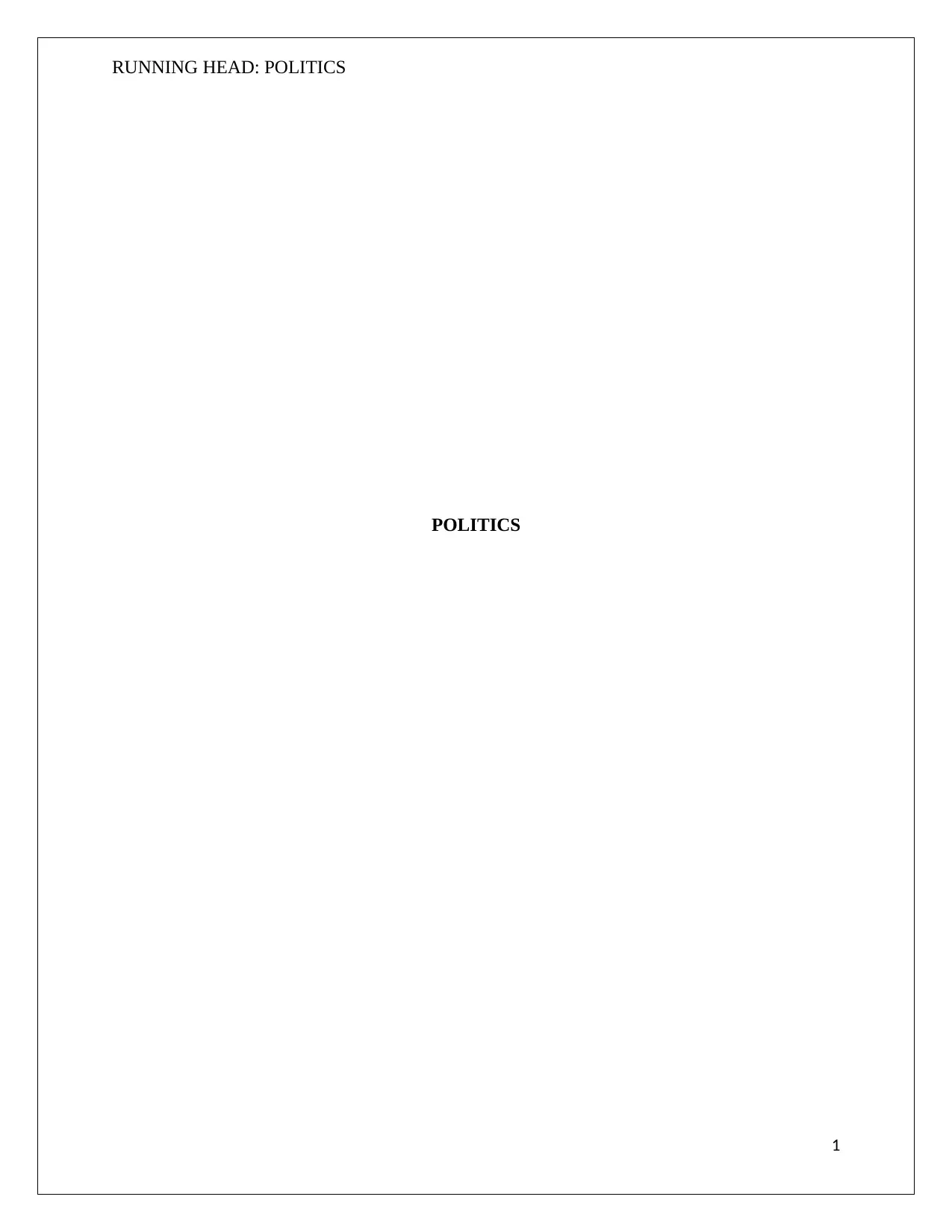
RUNNING HEAD: POLITICS
POLITICS
1
POLITICS
1
Paraphrase This Document
Need a fresh take? Get an instant paraphrase of this document with our AI Paraphraser
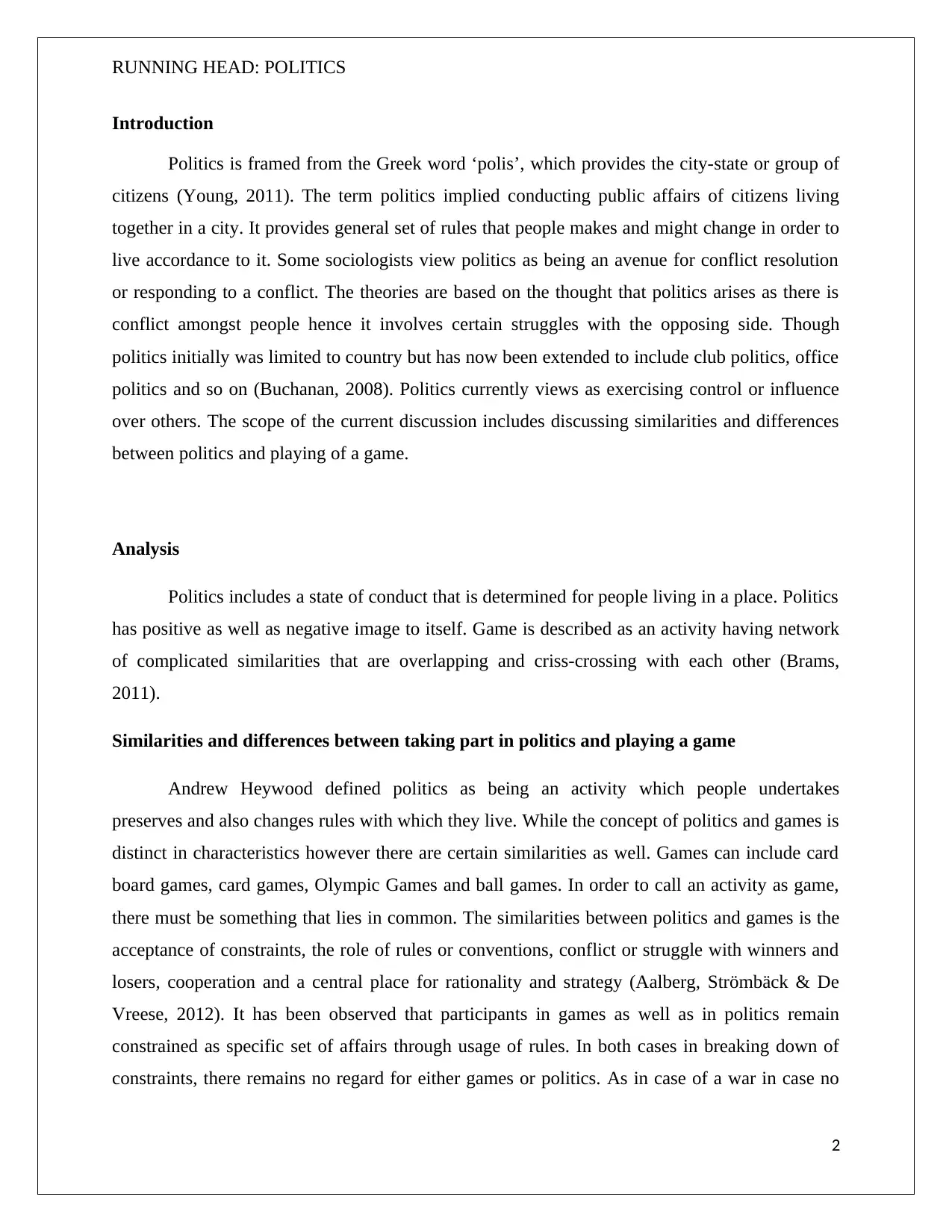
RUNNING HEAD: POLITICS
Introduction
Politics is framed from the Greek word ‘polis’, which provides the city-state or group of
citizens (Young, 2011). The term politics implied conducting public affairs of citizens living
together in a city. It provides general set of rules that people makes and might change in order to
live accordance to it. Some sociologists view politics as being an avenue for conflict resolution
or responding to a conflict. The theories are based on the thought that politics arises as there is
conflict amongst people hence it involves certain struggles with the opposing side. Though
politics initially was limited to country but has now been extended to include club politics, office
politics and so on (Buchanan, 2008). Politics currently views as exercising control or influence
over others. The scope of the current discussion includes discussing similarities and differences
between politics and playing of a game.
Analysis
Politics includes a state of conduct that is determined for people living in a place. Politics
has positive as well as negative image to itself. Game is described as an activity having network
of complicated similarities that are overlapping and criss-crossing with each other (Brams,
2011).
Similarities and differences between taking part in politics and playing a game
Andrew Heywood defined politics as being an activity which people undertakes
preserves and also changes rules with which they live. While the concept of politics and games is
distinct in characteristics however there are certain similarities as well. Games can include card
board games, card games, Olympic Games and ball games. In order to call an activity as game,
there must be something that lies in common. The similarities between politics and games is the
acceptance of constraints, the role of rules or conventions, conflict or struggle with winners and
losers, cooperation and a central place for rationality and strategy (Aalberg, Strömbäck & De
Vreese, 2012). It has been observed that participants in games as well as in politics remain
constrained as specific set of affairs through usage of rules. In both cases in breaking down of
constraints, there remains no regard for either games or politics. As in case of a war in case no
2
Introduction
Politics is framed from the Greek word ‘polis’, which provides the city-state or group of
citizens (Young, 2011). The term politics implied conducting public affairs of citizens living
together in a city. It provides general set of rules that people makes and might change in order to
live accordance to it. Some sociologists view politics as being an avenue for conflict resolution
or responding to a conflict. The theories are based on the thought that politics arises as there is
conflict amongst people hence it involves certain struggles with the opposing side. Though
politics initially was limited to country but has now been extended to include club politics, office
politics and so on (Buchanan, 2008). Politics currently views as exercising control or influence
over others. The scope of the current discussion includes discussing similarities and differences
between politics and playing of a game.
Analysis
Politics includes a state of conduct that is determined for people living in a place. Politics
has positive as well as negative image to itself. Game is described as an activity having network
of complicated similarities that are overlapping and criss-crossing with each other (Brams,
2011).
Similarities and differences between taking part in politics and playing a game
Andrew Heywood defined politics as being an activity which people undertakes
preserves and also changes rules with which they live. While the concept of politics and games is
distinct in characteristics however there are certain similarities as well. Games can include card
board games, card games, Olympic Games and ball games. In order to call an activity as game,
there must be something that lies in common. The similarities between politics and games is the
acceptance of constraints, the role of rules or conventions, conflict or struggle with winners and
losers, cooperation and a central place for rationality and strategy (Aalberg, Strömbäck & De
Vreese, 2012). It has been observed that participants in games as well as in politics remain
constrained as specific set of affairs through usage of rules. In both cases in breaking down of
constraints, there remains no regard for either games or politics. As in case of a war in case no
2
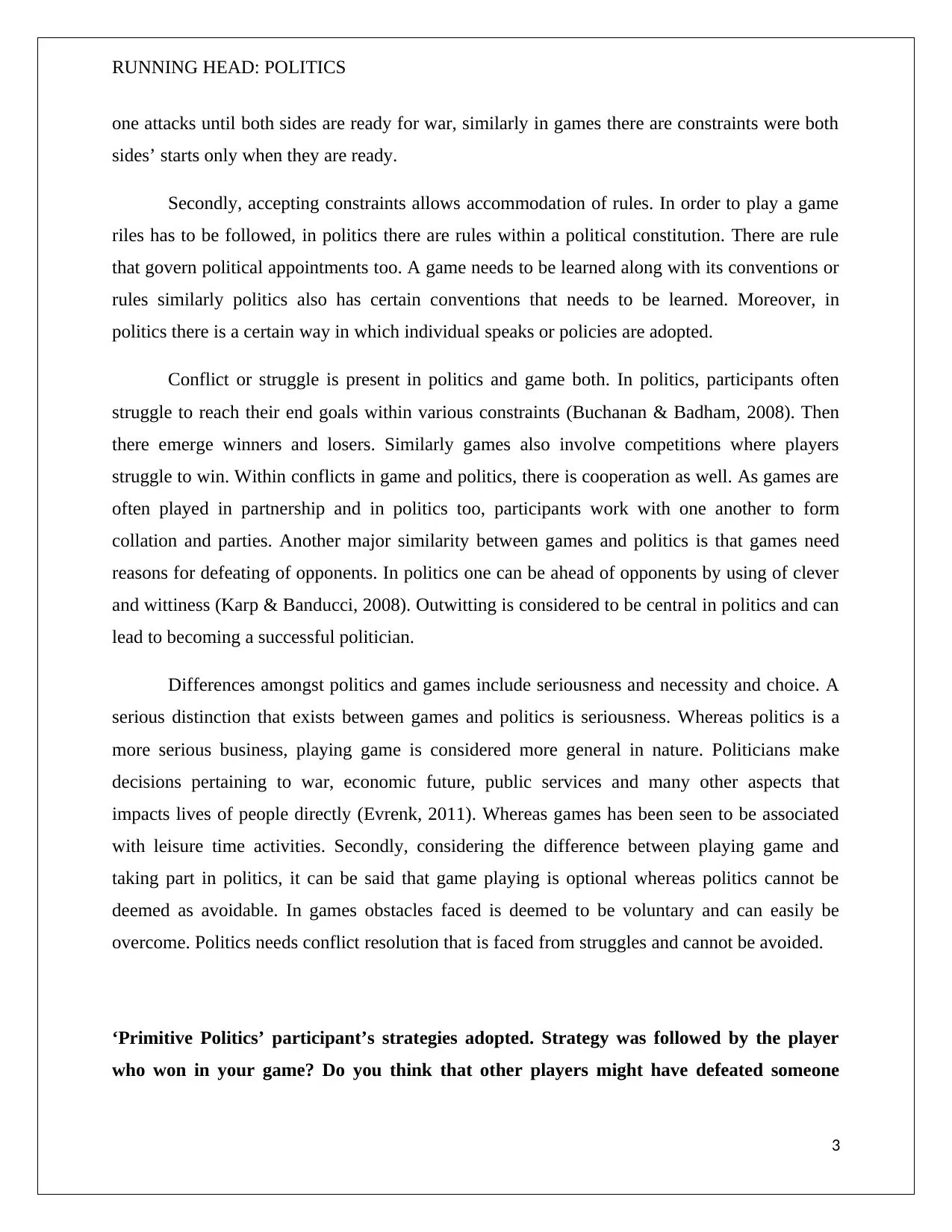
RUNNING HEAD: POLITICS
one attacks until both sides are ready for war, similarly in games there are constraints were both
sides’ starts only when they are ready.
Secondly, accepting constraints allows accommodation of rules. In order to play a game
riles has to be followed, in politics there are rules within a political constitution. There are rule
that govern political appointments too. A game needs to be learned along with its conventions or
rules similarly politics also has certain conventions that needs to be learned. Moreover, in
politics there is a certain way in which individual speaks or policies are adopted.
Conflict or struggle is present in politics and game both. In politics, participants often
struggle to reach their end goals within various constraints (Buchanan & Badham, 2008). Then
there emerge winners and losers. Similarly games also involve competitions where players
struggle to win. Within conflicts in game and politics, there is cooperation as well. As games are
often played in partnership and in politics too, participants work with one another to form
collation and parties. Another major similarity between games and politics is that games need
reasons for defeating of opponents. In politics one can be ahead of opponents by using of clever
and wittiness (Karp & Banducci, 2008). Outwitting is considered to be central in politics and can
lead to becoming a successful politician.
Differences amongst politics and games include seriousness and necessity and choice. A
serious distinction that exists between games and politics is seriousness. Whereas politics is a
more serious business, playing game is considered more general in nature. Politicians make
decisions pertaining to war, economic future, public services and many other aspects that
impacts lives of people directly (Evrenk, 2011). Whereas games has been seen to be associated
with leisure time activities. Secondly, considering the difference between playing game and
taking part in politics, it can be said that game playing is optional whereas politics cannot be
deemed as avoidable. In games obstacles faced is deemed to be voluntary and can easily be
overcome. Politics needs conflict resolution that is faced from struggles and cannot be avoided.
‘Primitive Politics’ participant’s strategies adopted. Strategy was followed by the player
who won in your game? Do you think that other players might have defeated someone
3
one attacks until both sides are ready for war, similarly in games there are constraints were both
sides’ starts only when they are ready.
Secondly, accepting constraints allows accommodation of rules. In order to play a game
riles has to be followed, in politics there are rules within a political constitution. There are rule
that govern political appointments too. A game needs to be learned along with its conventions or
rules similarly politics also has certain conventions that needs to be learned. Moreover, in
politics there is a certain way in which individual speaks or policies are adopted.
Conflict or struggle is present in politics and game both. In politics, participants often
struggle to reach their end goals within various constraints (Buchanan & Badham, 2008). Then
there emerge winners and losers. Similarly games also involve competitions where players
struggle to win. Within conflicts in game and politics, there is cooperation as well. As games are
often played in partnership and in politics too, participants work with one another to form
collation and parties. Another major similarity between games and politics is that games need
reasons for defeating of opponents. In politics one can be ahead of opponents by using of clever
and wittiness (Karp & Banducci, 2008). Outwitting is considered to be central in politics and can
lead to becoming a successful politician.
Differences amongst politics and games include seriousness and necessity and choice. A
serious distinction that exists between games and politics is seriousness. Whereas politics is a
more serious business, playing game is considered more general in nature. Politicians make
decisions pertaining to war, economic future, public services and many other aspects that
impacts lives of people directly (Evrenk, 2011). Whereas games has been seen to be associated
with leisure time activities. Secondly, considering the difference between playing game and
taking part in politics, it can be said that game playing is optional whereas politics cannot be
deemed as avoidable. In games obstacles faced is deemed to be voluntary and can easily be
overcome. Politics needs conflict resolution that is faced from struggles and cannot be avoided.
‘Primitive Politics’ participant’s strategies adopted. Strategy was followed by the player
who won in your game? Do you think that other players might have defeated someone
3
⊘ This is a preview!⊘
Do you want full access?
Subscribe today to unlock all pages.

Trusted by 1+ million students worldwide
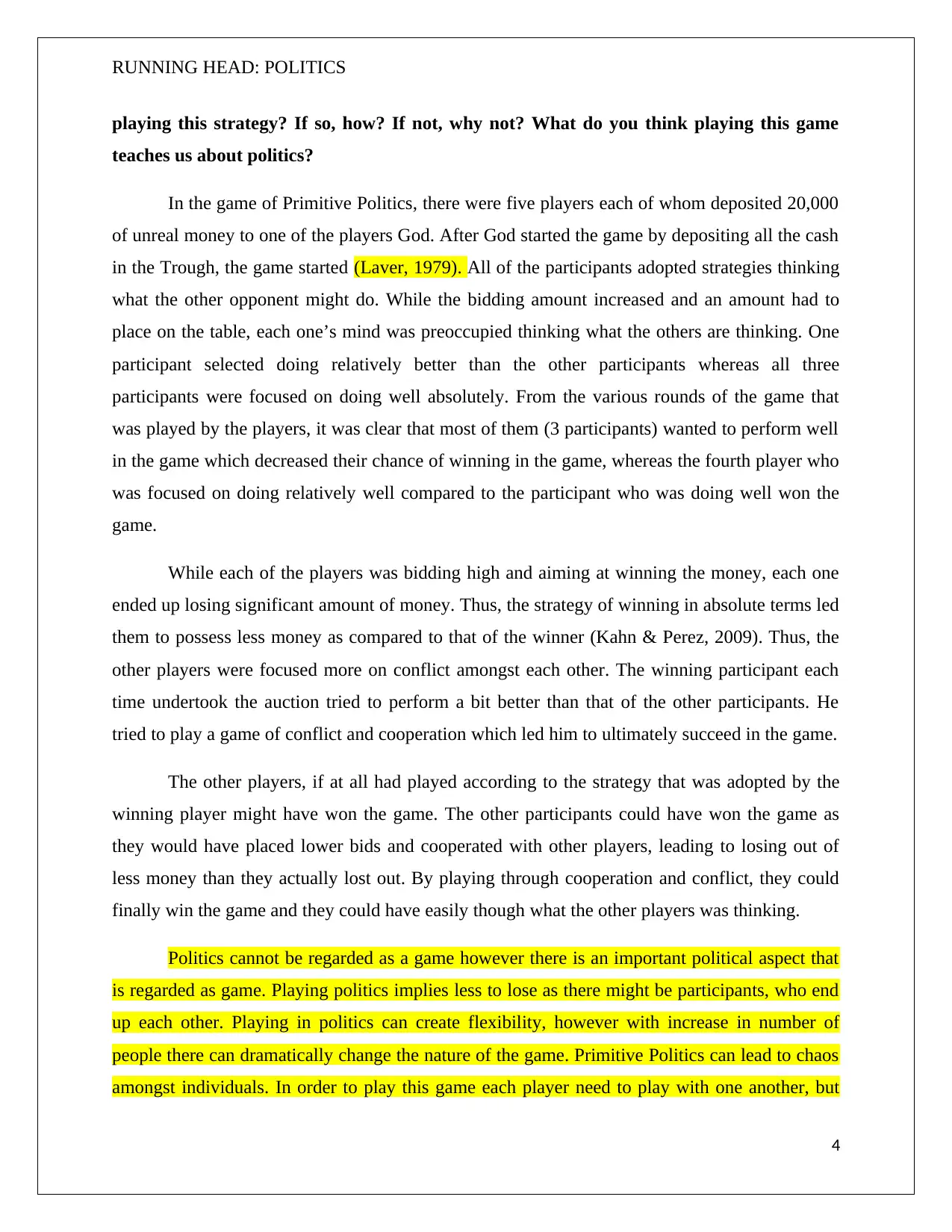
RUNNING HEAD: POLITICS
playing this strategy? If so, how? If not, why not? What do you think playing this game
teaches us about politics?
In the game of Primitive Politics, there were five players each of whom deposited 20,000
of unreal money to one of the players God. After God started the game by depositing all the cash
in the Trough, the game started (Laver, 1979). All of the participants adopted strategies thinking
what the other opponent might do. While the bidding amount increased and an amount had to
place on the table, each one’s mind was preoccupied thinking what the others are thinking. One
participant selected doing relatively better than the other participants whereas all three
participants were focused on doing well absolutely. From the various rounds of the game that
was played by the players, it was clear that most of them (3 participants) wanted to perform well
in the game which decreased their chance of winning in the game, whereas the fourth player who
was focused on doing relatively well compared to the participant who was doing well won the
game.
While each of the players was bidding high and aiming at winning the money, each one
ended up losing significant amount of money. Thus, the strategy of winning in absolute terms led
them to possess less money as compared to that of the winner (Kahn & Perez, 2009). Thus, the
other players were focused more on conflict amongst each other. The winning participant each
time undertook the auction tried to perform a bit better than that of the other participants. He
tried to play a game of conflict and cooperation which led him to ultimately succeed in the game.
The other players, if at all had played according to the strategy that was adopted by the
winning player might have won the game. The other participants could have won the game as
they would have placed lower bids and cooperated with other players, leading to losing out of
less money than they actually lost out. By playing through cooperation and conflict, they could
finally win the game and they could have easily though what the other players was thinking.
Politics cannot be regarded as a game however there is an important political aspect that
is regarded as game. Playing politics implies less to lose as there might be participants, who end
up each other. Playing in politics can create flexibility, however with increase in number of
people there can dramatically change the nature of the game. Primitive Politics can lead to chaos
amongst individuals. In order to play this game each player need to play with one another, but
4
playing this strategy? If so, how? If not, why not? What do you think playing this game
teaches us about politics?
In the game of Primitive Politics, there were five players each of whom deposited 20,000
of unreal money to one of the players God. After God started the game by depositing all the cash
in the Trough, the game started (Laver, 1979). All of the participants adopted strategies thinking
what the other opponent might do. While the bidding amount increased and an amount had to
place on the table, each one’s mind was preoccupied thinking what the others are thinking. One
participant selected doing relatively better than the other participants whereas all three
participants were focused on doing well absolutely. From the various rounds of the game that
was played by the players, it was clear that most of them (3 participants) wanted to perform well
in the game which decreased their chance of winning in the game, whereas the fourth player who
was focused on doing relatively well compared to the participant who was doing well won the
game.
While each of the players was bidding high and aiming at winning the money, each one
ended up losing significant amount of money. Thus, the strategy of winning in absolute terms led
them to possess less money as compared to that of the winner (Kahn & Perez, 2009). Thus, the
other players were focused more on conflict amongst each other. The winning participant each
time undertook the auction tried to perform a bit better than that of the other participants. He
tried to play a game of conflict and cooperation which led him to ultimately succeed in the game.
The other players, if at all had played according to the strategy that was adopted by the
winning player might have won the game. The other participants could have won the game as
they would have placed lower bids and cooperated with other players, leading to losing out of
less money than they actually lost out. By playing through cooperation and conflict, they could
finally win the game and they could have easily though what the other players was thinking.
Politics cannot be regarded as a game however there is an important political aspect that
is regarded as game. Playing politics implies less to lose as there might be participants, who end
up each other. Playing in politics can create flexibility, however with increase in number of
people there can dramatically change the nature of the game. Primitive Politics can lead to chaos
amongst individuals. In order to play this game each player need to play with one another, but
4
Paraphrase This Document
Need a fresh take? Get an instant paraphrase of this document with our AI Paraphraser
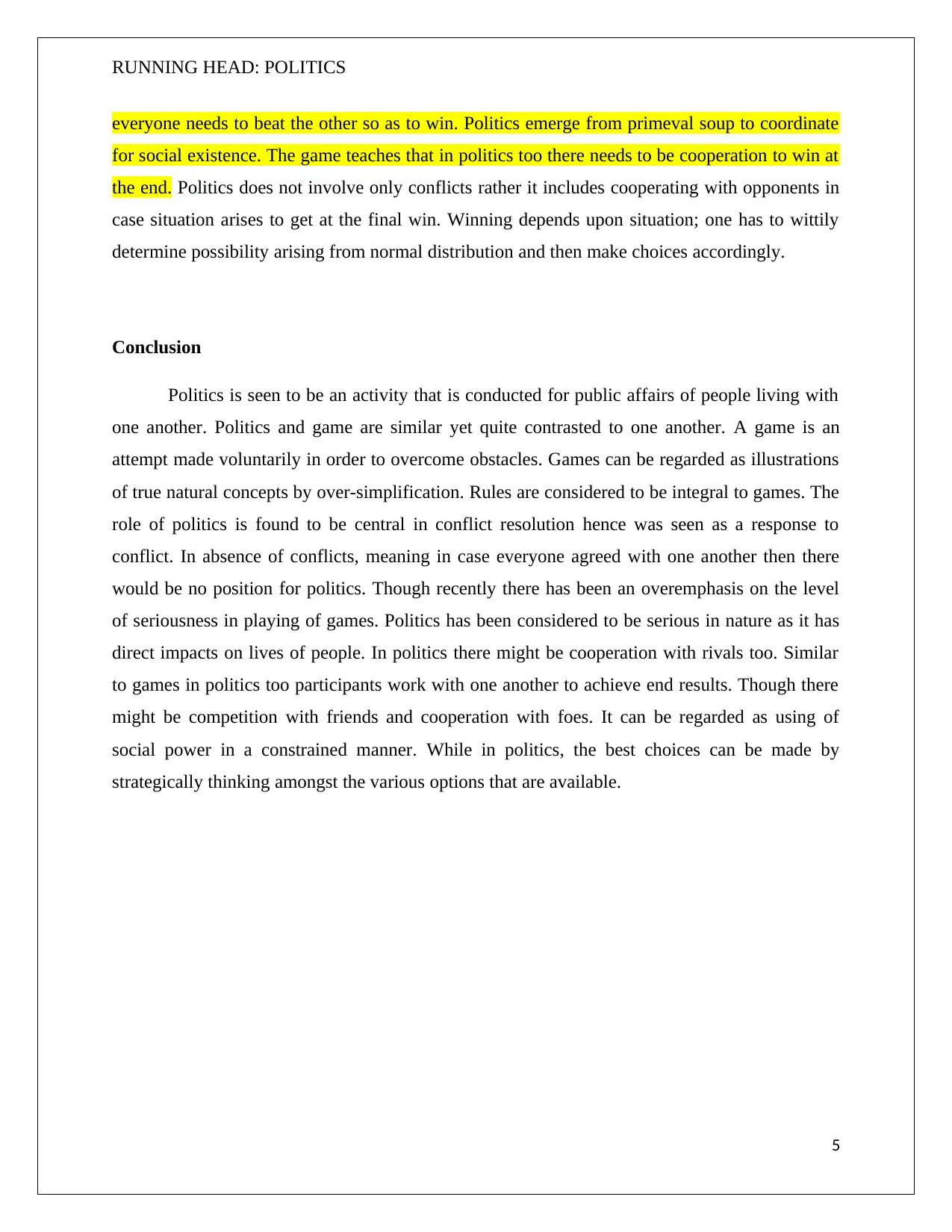
RUNNING HEAD: POLITICS
everyone needs to beat the other so as to win. Politics emerge from primeval soup to coordinate
for social existence. The game teaches that in politics too there needs to be cooperation to win at
the end. Politics does not involve only conflicts rather it includes cooperating with opponents in
case situation arises to get at the final win. Winning depends upon situation; one has to wittily
determine possibility arising from normal distribution and then make choices accordingly.
Conclusion
Politics is seen to be an activity that is conducted for public affairs of people living with
one another. Politics and game are similar yet quite contrasted to one another. A game is an
attempt made voluntarily in order to overcome obstacles. Games can be regarded as illustrations
of true natural concepts by over-simplification. Rules are considered to be integral to games. The
role of politics is found to be central in conflict resolution hence was seen as a response to
conflict. In absence of conflicts, meaning in case everyone agreed with one another then there
would be no position for politics. Though recently there has been an overemphasis on the level
of seriousness in playing of games. Politics has been considered to be serious in nature as it has
direct impacts on lives of people. In politics there might be cooperation with rivals too. Similar
to games in politics too participants work with one another to achieve end results. Though there
might be competition with friends and cooperation with foes. It can be regarded as using of
social power in a constrained manner. While in politics, the best choices can be made by
strategically thinking amongst the various options that are available.
5
everyone needs to beat the other so as to win. Politics emerge from primeval soup to coordinate
for social existence. The game teaches that in politics too there needs to be cooperation to win at
the end. Politics does not involve only conflicts rather it includes cooperating with opponents in
case situation arises to get at the final win. Winning depends upon situation; one has to wittily
determine possibility arising from normal distribution and then make choices accordingly.
Conclusion
Politics is seen to be an activity that is conducted for public affairs of people living with
one another. Politics and game are similar yet quite contrasted to one another. A game is an
attempt made voluntarily in order to overcome obstacles. Games can be regarded as illustrations
of true natural concepts by over-simplification. Rules are considered to be integral to games. The
role of politics is found to be central in conflict resolution hence was seen as a response to
conflict. In absence of conflicts, meaning in case everyone agreed with one another then there
would be no position for politics. Though recently there has been an overemphasis on the level
of seriousness in playing of games. Politics has been considered to be serious in nature as it has
direct impacts on lives of people. In politics there might be cooperation with rivals too. Similar
to games in politics too participants work with one another to achieve end results. Though there
might be competition with friends and cooperation with foes. It can be regarded as using of
social power in a constrained manner. While in politics, the best choices can be made by
strategically thinking amongst the various options that are available.
5
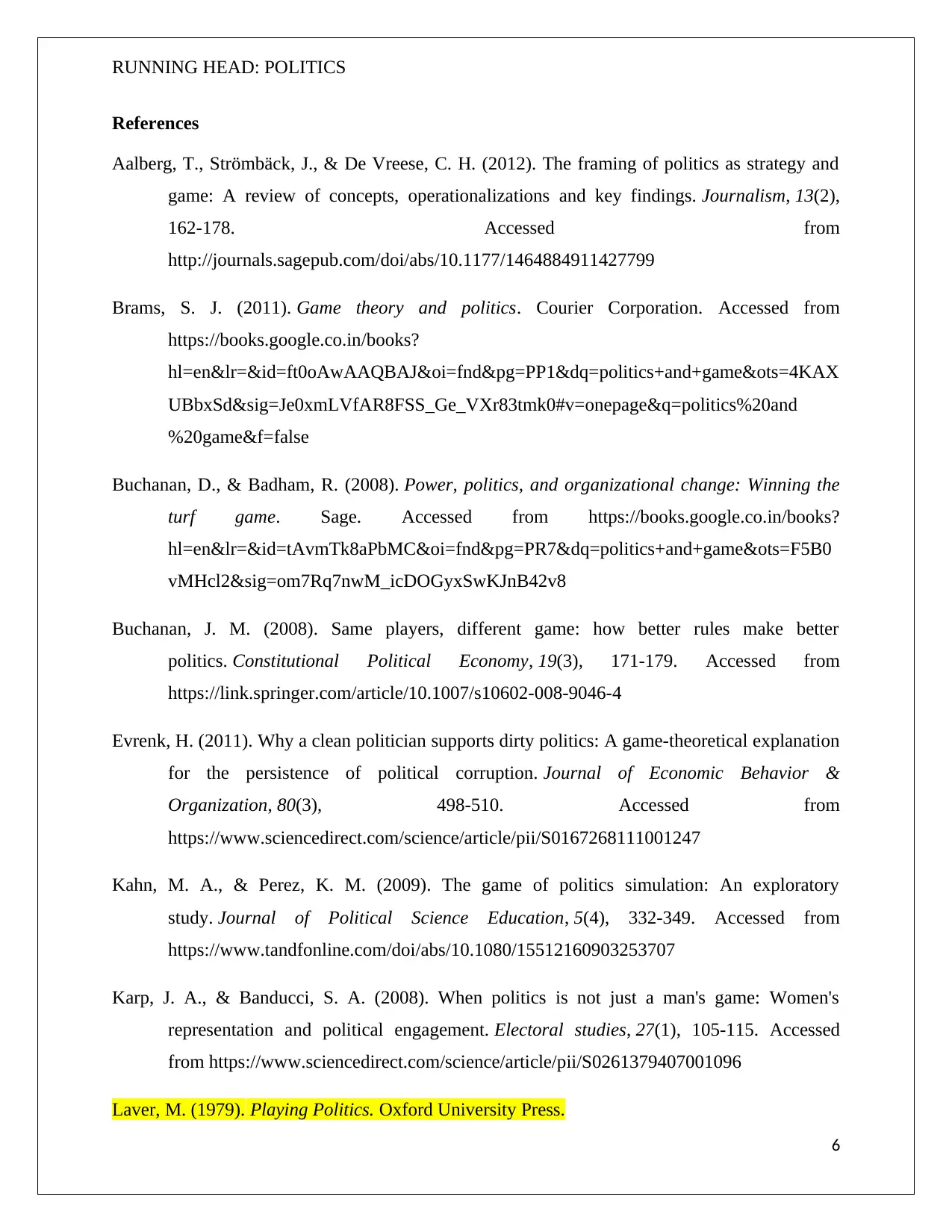
RUNNING HEAD: POLITICS
References
Aalberg, T., Strömbäck, J., & De Vreese, C. H. (2012). The framing of politics as strategy and
game: A review of concepts, operationalizations and key findings. Journalism, 13(2),
162-178. Accessed from
http://journals.sagepub.com/doi/abs/10.1177/1464884911427799
Brams, S. J. (2011). Game theory and politics. Courier Corporation. Accessed from
https://books.google.co.in/books?
hl=en&lr=&id=ft0oAwAAQBAJ&oi=fnd&pg=PP1&dq=politics+and+game&ots=4KAX
UBbxSd&sig=Je0xmLVfAR8FSS_Ge_VXr83tmk0#v=onepage&q=politics%20and
%20game&f=false
Buchanan, D., & Badham, R. (2008). Power, politics, and organizational change: Winning the
turf game. Sage. Accessed from https://books.google.co.in/books?
hl=en&lr=&id=tAvmTk8aPbMC&oi=fnd&pg=PR7&dq=politics+and+game&ots=F5B0
vMHcl2&sig=om7Rq7nwM_icDOGyxSwKJnB42v8
Buchanan, J. M. (2008). Same players, different game: how better rules make better
politics. Constitutional Political Economy, 19(3), 171-179. Accessed from
https://link.springer.com/article/10.1007/s10602-008-9046-4
Evrenk, H. (2011). Why a clean politician supports dirty politics: A game-theoretical explanation
for the persistence of political corruption. Journal of Economic Behavior &
Organization, 80(3), 498-510. Accessed from
https://www.sciencedirect.com/science/article/pii/S0167268111001247
Kahn, M. A., & Perez, K. M. (2009). The game of politics simulation: An exploratory
study. Journal of Political Science Education, 5(4), 332-349. Accessed from
https://www.tandfonline.com/doi/abs/10.1080/15512160903253707
Karp, J. A., & Banducci, S. A. (2008). When politics is not just a man's game: Women's
representation and political engagement. Electoral studies, 27(1), 105-115. Accessed
from https://www.sciencedirect.com/science/article/pii/S0261379407001096
Laver, M. (1979). Playing Politics. Oxford University Press.
6
References
Aalberg, T., Strömbäck, J., & De Vreese, C. H. (2012). The framing of politics as strategy and
game: A review of concepts, operationalizations and key findings. Journalism, 13(2),
162-178. Accessed from
http://journals.sagepub.com/doi/abs/10.1177/1464884911427799
Brams, S. J. (2011). Game theory and politics. Courier Corporation. Accessed from
https://books.google.co.in/books?
hl=en&lr=&id=ft0oAwAAQBAJ&oi=fnd&pg=PP1&dq=politics+and+game&ots=4KAX
UBbxSd&sig=Je0xmLVfAR8FSS_Ge_VXr83tmk0#v=onepage&q=politics%20and
%20game&f=false
Buchanan, D., & Badham, R. (2008). Power, politics, and organizational change: Winning the
turf game. Sage. Accessed from https://books.google.co.in/books?
hl=en&lr=&id=tAvmTk8aPbMC&oi=fnd&pg=PR7&dq=politics+and+game&ots=F5B0
vMHcl2&sig=om7Rq7nwM_icDOGyxSwKJnB42v8
Buchanan, J. M. (2008). Same players, different game: how better rules make better
politics. Constitutional Political Economy, 19(3), 171-179. Accessed from
https://link.springer.com/article/10.1007/s10602-008-9046-4
Evrenk, H. (2011). Why a clean politician supports dirty politics: A game-theoretical explanation
for the persistence of political corruption. Journal of Economic Behavior &
Organization, 80(3), 498-510. Accessed from
https://www.sciencedirect.com/science/article/pii/S0167268111001247
Kahn, M. A., & Perez, K. M. (2009). The game of politics simulation: An exploratory
study. Journal of Political Science Education, 5(4), 332-349. Accessed from
https://www.tandfonline.com/doi/abs/10.1080/15512160903253707
Karp, J. A., & Banducci, S. A. (2008). When politics is not just a man's game: Women's
representation and political engagement. Electoral studies, 27(1), 105-115. Accessed
from https://www.sciencedirect.com/science/article/pii/S0261379407001096
Laver, M. (1979). Playing Politics. Oxford University Press.
6
⊘ This is a preview!⊘
Do you want full access?
Subscribe today to unlock all pages.

Trusted by 1+ million students worldwide
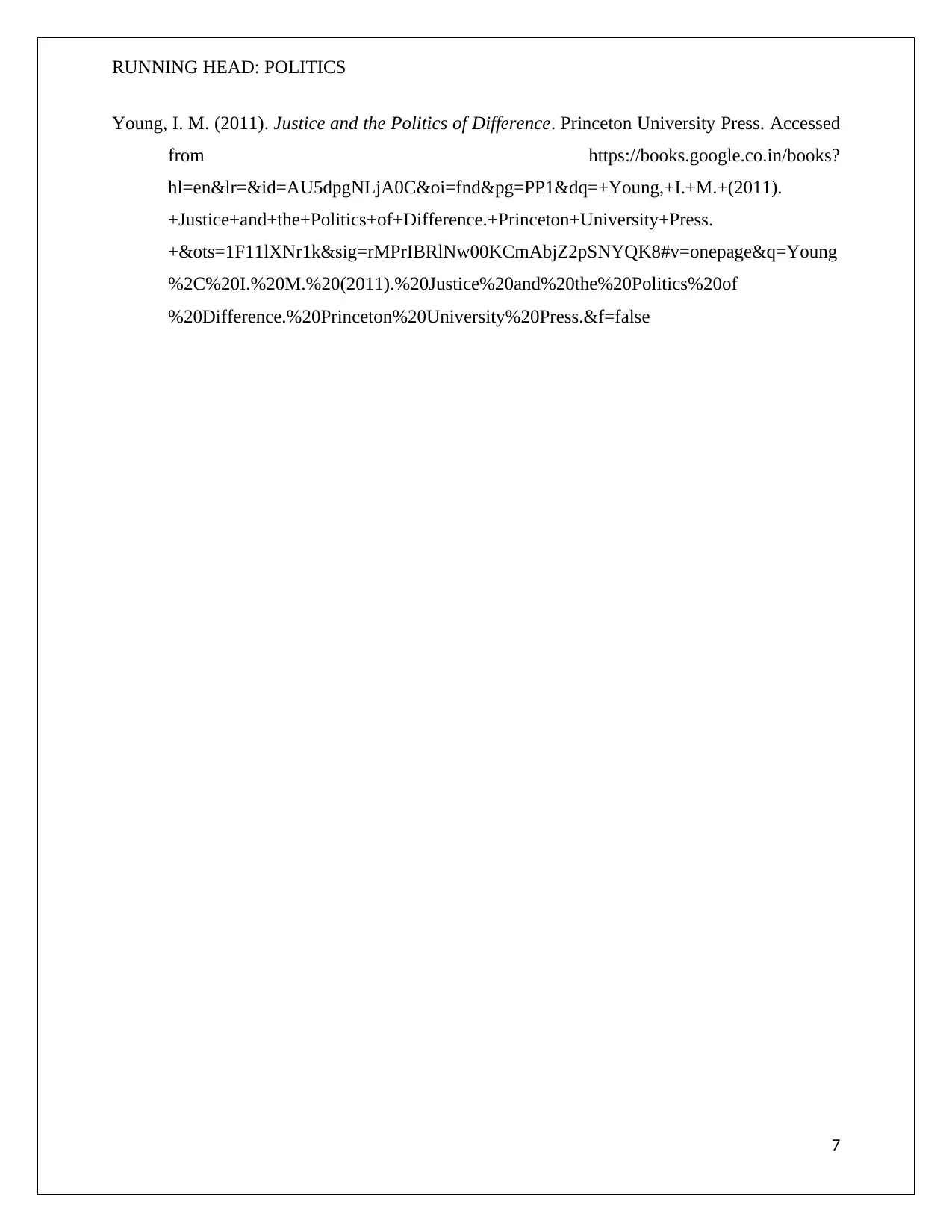
RUNNING HEAD: POLITICS
Young, I. M. (2011). Justice and the Politics of Difference. Princeton University Press. Accessed
from https://books.google.co.in/books?
hl=en&lr=&id=AU5dpgNLjA0C&oi=fnd&pg=PP1&dq=+Young,+I.+M.+(2011).
+Justice+and+the+Politics+of+Difference.+Princeton+University+Press.
+&ots=1F11lXNr1k&sig=rMPrIBRlNw00KCmAbjZ2pSNYQK8#v=onepage&q=Young
%2C%20I.%20M.%20(2011).%20Justice%20and%20the%20Politics%20of
%20Difference.%20Princeton%20University%20Press.&f=false
7
Young, I. M. (2011). Justice and the Politics of Difference. Princeton University Press. Accessed
from https://books.google.co.in/books?
hl=en&lr=&id=AU5dpgNLjA0C&oi=fnd&pg=PP1&dq=+Young,+I.+M.+(2011).
+Justice+and+the+Politics+of+Difference.+Princeton+University+Press.
+&ots=1F11lXNr1k&sig=rMPrIBRlNw00KCmAbjZ2pSNYQK8#v=onepage&q=Young
%2C%20I.%20M.%20(2011).%20Justice%20and%20the%20Politics%20of
%20Difference.%20Princeton%20University%20Press.&f=false
7
1 out of 7
Your All-in-One AI-Powered Toolkit for Academic Success.
+13062052269
info@desklib.com
Available 24*7 on WhatsApp / Email
![[object Object]](/_next/static/media/star-bottom.7253800d.svg)
Unlock your academic potential
Copyright © 2020–2025 A2Z Services. All Rights Reserved. Developed and managed by ZUCOL.